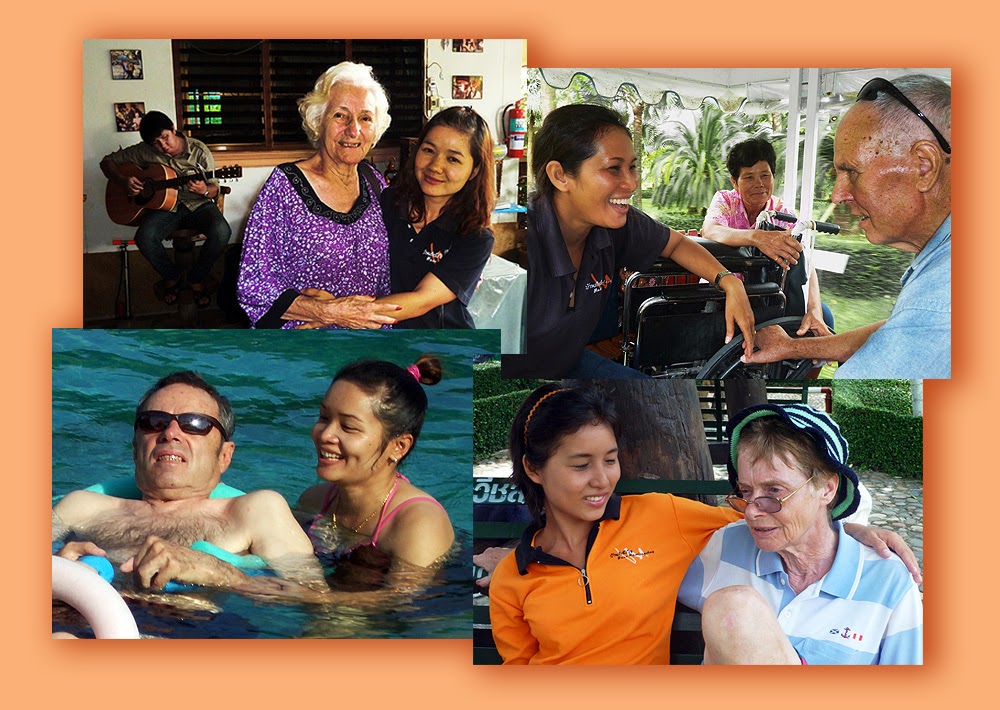Outsourcing Seniors with Dementia Overseas for Better Care?
Spouses and relatives in Western nations are increasingly confronting the dilemma of placement for care of loved ones with dementia. As the number of Alzheimer's patients and costs rise, and the supply of qualified nurses and facilities struggles to keep up. Faraway countries are offering cheaper, and to some minds better, care for those suffering from the irreversible loss of memory.
The
number of people over 60 worldwide is set to more than triple between 2000 and
2050 to 2 billion, according to the World Health Organization. And more are
opting for retirement in lower-cost countries.
"Medical
tourism" has become a booming industry, with roughly 8 million people a
year seeking treatment abroad, according to the group Patients Without Borders.
Facilities in
Thailand also are preparing to attract more Alzheimer's sufferers. In Chiang
Mai, a pleasant city ringed by mountains, Baan Kamlangchay a $10 million,
holiday-like home scheduled to open before mid-2014. Also on the way is a small
Alzheimer's unit within a retirement community set on the grounds of a former
four-star resort. With Thailand seeking to strengthen its already leading
position as a medical tourism and retirement destination, similar projects are
likely.The pioneering Baan Kamlangchay was established by Martin Woodtli, a Swiss who spent four years in Thailand with the aid group Doctors Without Borders before returning home to care for his Alzheimer's diagnosed mother.
Wanting
to return to Thailand and knowing that Thais traditionally regard the elderly
with great respect, he brought his mother to Chiang Mai, where she became the
home's first "guest." Woodtli never uses the word
"patient."
Over
the next 10 years, the 52-year-old psychologist and social worker purchased or
rented eight two-story houses where 13 Swiss and German patients now reside.
Two people normally share the modest but well-kept, fully furnished houses,
each sleeping in a separate bedroom along with their caretaker. The monthly
$3,800 cost is a third of what basic institutional care would come to in
Switzerland
An additional facility being built in the outlying Chiang Mai district of Doi Saket will have amenities that would be tough for its European counterparts to match, including a clubhouse with a massage room and beauty parlor, a restaurant, Swiss bakery and pavilions with soaring ceilings and skylights.
"The
idea is that this is a resort, not a hospital," says Marc H. Dumur, a
veteran hotelier who will manage the Swiss-owned, 3.5-hectare (8.7-acre)
facility built amid orchards and groves of teak. Going up are 72 patient rooms
in six spacious pavilions, plus villas for visiting family members.
Around-the-clock care will be provided by a staff of 150, including a Swiss
head nurse and at least one licensed Thai nurse for each pavilion.
British
businessman Peter Brown has turned a bankrupt resort into the Care Resort
Chiang Mai. Residents will live in five-room units, watched over by nurses 24
hours a day, and walk out into extensive, landscaped grounds, with a thousand
trees and a lake, set in a tranquil area at the foot of mountains.
"In
Europe they tend to follow a lock-up system. They know what should be done but
they just don't have the staff to do it — to take patients to visit gardens, to
give them some freedom," Brown says. "And the carers tend to come
from the lower end of the nursing system. They often don't have the desire to
work with Alzheimer's patients or an affinity with them."
The nascent trend is unnerving to some experts who say uprooting people with Alzheimer's will add to their sense of displacement and anxiety, though others say quality of care is more important than location. There's also some general uneasiness over the idea of sending ailing elderly people abroad: The German press has branded it "gerontological colonialism."
However,
Germany is already sending several thousand sufferers, as well as the aged and
otherwise ill, to Eastern Europe, Spain, Greece and Ukraine. Patients are even
moving from Switzerland, which was ranked No. 1 in health care for the elderly
this year in an index compiled by the elderly advocacy group HelpAge
International and the U.N. Population Fund.
The
Philippines is offering Americans care for $1,500 to $3,500 a month — as
compared to $6,900 the American Elder Care Research Organization says is the
average monthly bill for a private room in a skilled nursing U.S. facility.
About 100 Americans are currently seeking care in the Philippines but more
facilities are being built and a marketing campaign will be launched in 2014,
says J.J. Reyes, who is planning a retirement community near Manila.

Comments
Post a Comment